美国法律文化chapter 5 STEPS IN THE FEDERAL CRIMINAL PROCESS
- 格式:ppt
- 大小:18.88 MB
- 文档页数:39
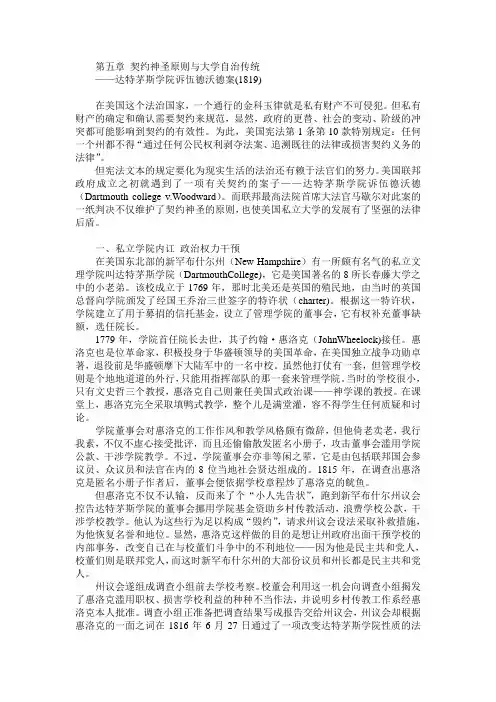
第五章契约神圣原则与大学自治传统——达特茅斯学院诉伍德沃德案(1819)在美国这个法治国家,一个通行的金科玉律就是私有财产不可侵犯。
但私有财产的确定和确认需要契约来规范,显然,政府的更替、社会的变动、阶级的冲突都可能影响到契约的有效性。
为此,美国宪法第1条第10款特别规定:任何一个州都不得“通过任何公民权利剥夺法案、追溯既往的法律或损害契约义务的法律”。
但宪法文本的规定要化为现实生活的法治还有赖于法官们的努力。
美国联邦政府成立之初就遇到了一项有关契约的案子——达特茅斯学院诉伍德沃德(Dartmouth college v.Woodward)。
而联邦最高法院首席大法官马歇尔对此案的一纸判决不仅维护了契约神圣的原则,也使美国私立大学的发展有了坚强的法律后盾。
一、私立学院内讧政治权力干预在美国东北部的新罕布什尔州(New Hampshire)有一所颇有名气的私立文理学院叫达特茅斯学院(DartmouthCollege),它是美国著名的8所长春藤大学之中的小老弟。
该校成立于1769年,那时北美还是英国的殖民地,由当时的英国总督向学院颁发了经国王乔治三世签字的特许状(charter)。
根据这一特许状,学院建立了用于募捐的信托基金,设立了管理学院的董事会,它有权补充董事缺额,选任院长。
1779年,学院首任院长去世,其子约翰·惠洛克(JohnWheelock)接任。
惠洛克也是位革命家,积极投身于华盛顿领导的美国革命,在美国独立战争功勋卓著,退役前是华盛顿摩下大陆军中的一名中校。
虽然他打仗有一套,但管理学校则是个地地道道的外行,只能用指挥部队的那一套来管理学院。
当时的学校很小,只有文史哲三个教授,惠洛克自己则兼任美国式政治课——神学课的教授。
在课堂上,惠洛克完全采取填鸭式教学,整个儿是满堂灌,容不得学生任何质疑和讨论。
学院董事会对惠洛克的工作作风和教学风格颇有微辞,但他倚老卖老,我行我素,不仅不虚心接受批评,而且还偷偷散发匿名小册子,攻击董事会滥用学院公款、干涉学院教学。
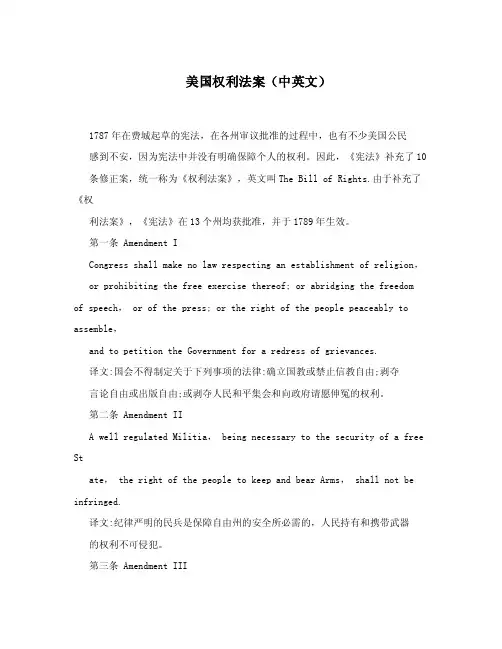
美国权利法案(中英文)1787年在费城起草的宪法,在各州审议批准的过程中,也有不少美国公民感到不安,因为宪法中并没有明确保障个人的权利。
因此,《宪法》补充了10 条修正案,统一称为《权利法案》,英文叫The Bill of Rights.由于补充了《权利法案》,《宪法》在13个州均获批准,并于1789年生效。
第一条 Amendment ICongress shall make no law respecting an establishment of religion,or prohibiting the free exercise thereof; or abridging the freedomof speech, or of the press; or the right of the people peaceably to assemble,and to petition the Government for a redress of grievances.译文:国会不得制定关于下列事项的法律:确立国教或禁止信教自由;剥夺言论自由或出版自由;或剥夺人民和平集会和向政府请愿伸冤的权利。
第二条 Amendment IIA well regulated Militia, being necessary to the security of a free State, the right of the people to keep and bear Arms, shall not be infringed.译文:纪律严明的民兵是保障自由州的安全所必需的,人民持有和携带武器的权利不可侵犯。
第三条 Amendment IIINo Soldier shall, in time of peace be quartered in any house, with out the consent of the Owner, nor in time of war, but in a manner tobe prescribed by law.译文:未经房主同意,士兵平时不得驻扎在任何住宅;除依法律规定的方式,战时也不得驻扎。
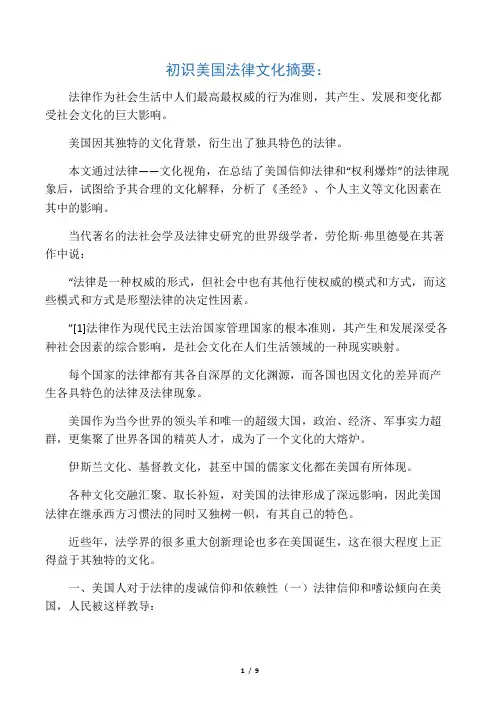
初识美国法律文化摘要:法律作为社会生活中人们最高最权威的行为准则,其产生、发展和变化都受社会文化的巨大影响。
美国因其独特的文化背景,衍生出了独具特色的法律。
本文通过法律——文化视角,在总结了美国信仰法律和“权利爆炸”的法律现象后,试图给予其合理的文化解释,分析了《圣经》、个人主义等文化因素在其中的影响。
当代著名的法社会学及法律史研究的世界级学者,劳伦斯·弗里德曼在其著作中说:“法律是一种权威的形式,但社会中也有其他行使权威的模式和方式,而这些模式和方式是形塑法律的决定性因素。
”[1]法律作为现代民主法治国家管理国家的根本准则,其产生和发展深受各种社会因素的综合影响,是社会文化在人们生活领域的一种现实映射。
每个国家的法律都有其各自深厚的文化渊源,而各国也因文化的差异而产生各具特色的法律及法律现象。
美国作为当今世界的领头羊和唯一的超级大国,政治、经济、军事实力超群,更集聚了世界各国的精英人才,成为了一个文化的大熔炉。
伊斯兰文化、基督教文化,甚至中国的儒家文化都在美国有所体现。
各种文化交融汇聚、取长补短,对美国的法律形成了深远影响,因此美国法律在继承西方习惯法的同时又独树一帜,有其自己的特色。
近些年,法学界的很多重大创新理论也多在美国诞生,这在很大程度上正得益于其独特的文化。
一、美国人对于法律的虔诚信仰和依赖性(一)法律信仰和嗜讼倾向在美国,人民被这样教导:在政府的各种机构制度中只有法律一项要遵守,而可以轻蔑地谈论总统、议员和将军们,并用苛刻的言语对政府机关进行批评。
一个人可能在白宫侮辱总统,而只是受到谴责,被斥为粗野的家伙,但是如果在法庭上哪怕对最低级的法官不尊敬都将被判处徒刑。
许多人,甚至一个不同意现在的法律并且企图改革它的人,都将遵守法律作为防止无政府状态的必要的屏障。
甚至有一个叫保罗·阿什里的律师出版了一本题为《“呵,答应我,但请书面写出”》的书,主张未来的婚姻伴侣们、大学院校同房间的人们以及所有其他共同生活的人们都应该准备种种契约,在契约里详细清楚地说明所有各方的责任和义务,如考虑“禁止吸烟条款”、“谁倒垃圾条款”以及“同每二种姻亲一起消磨时间的分配条款”等等。

美国联邦宪法第五和第十四条修正案规定,“非经正当法律程序,不得剥夺任何人的生命、自由和财产”,这便是著名的正当法律程序条款。
它虽然是美国宪法中最难理解的部分,[1](209页)却又被认为是美国法律的本质所在;[2](19页)它虽然引起了前所未有的论争,对什么是正当法律程序至今未达成一致意见,①却在上诉到联邦最高法院的案件中有40%与正当法律程序有关,在联邦最高法院适用于各个案件的次数远远超过美国宪法其它条款的规定,[3](68页)而成为美国公民权利的最重要的宪法保障。
[4](54页)正当法律程序的理论和实践已经成为美国宪政的基石。
正如美国著名法官本杰明·卡多佐所指出的,“不经正当法律过程,无人应被剥夺自由,这是一个最具普遍性的概念。
”[5](46页)“当今世界任何一个追求文明与进步的民族,都应该有他们自己的正当程序,尽管他们也许并不使用‘正当程序’这个称谓”,[6](149-150页)“这是当今世界的任何一种司法制度须臾不可缺的东西。
”[6](137页)看来,正当法律程序正在超越英、美法系的传统文化藩篱,而逐渐为世界其他法律文化所认同。
壹从程序性正当法律程序到实质性正当法律程序丹宁勋爵在他的《法律的正当程序》中说:“我所说的‘正当程序’指的不是枯燥的诉讼案例,它在这里和国会第一次使用这个词时所指的意思倒极其相似。
它出现在1354年爱德华三世第二十八号法令第三章中:‘未经法律的正当程序进行答辩,对任何财产和身份的拥有者一律不得剥夺其土地或住所,不得逮捕或监禁,不得剥夺继承权和生命’。
”“我所说的正当程序也和麦迪逊(Madison)提出美国宪法修正案时所说的非常相似,它已被1791年第五条修正案所确认,即‘未经法律的正当程序,不得剥夺任何人的生命、自由和财产’。
”[7](前言)“法律的正当程序”即本文的正当法律程序,英文表达为:dueprocessoflaw。
②在这里,丹宁勋爵的前一句话揭示了正当法律程序的渊源:1354年,真正法律意义上的正当法律程序条款第一次正式出现在爱德华三世的法律文件中。
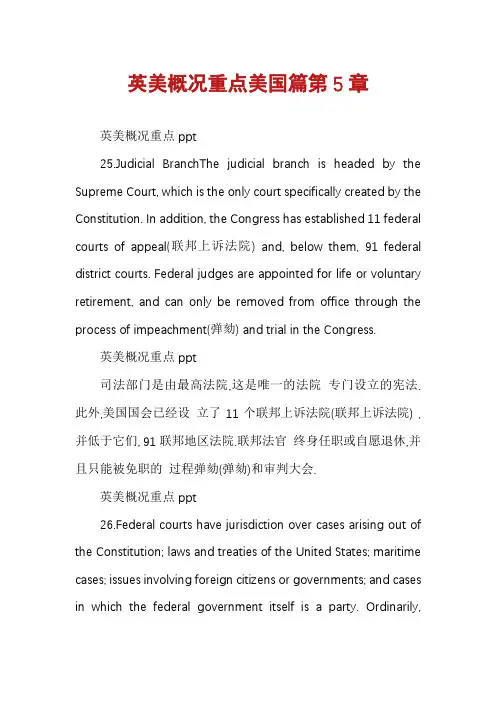
英美概况重点美国篇第5章英美概况重点ppt25.Judicial BranchThe judicial branch is headed by the Supreme Court, which is the only court specifically created by the Constitution. In addition, the Congress has established 11 federal courts of appeal(联邦上诉法院) and, below them, 91 federal district courts. Federal judges are appointed for life or voluntary retirement, and can only be removed from office through the process of impeachment(弹劾) and trial in the Congress.英美概况重点ppt司法部门是由最高法院,这是唯一的法院专门设立的宪法.此外,美国国会已经设立了11个联邦上诉法院(联邦上诉法院) , 并低于它们, 91联邦地区法院.联邦法官终身任职或自愿退休,并且只能被免职的过程弹劾(弹劾)和审判大会.英美概况重点ppt26.Federal courts have jurisdiction over cases arising out of the Constitution; laws and treaties of the United States; maritime cases; issues involving foreign citizens or governments; and cases in which the federal government itself is a party. Ordinarily,federal courts do not hear cases arising out of the laws of individual states. The Supreme Court today consists of a chief justice(首席大法官)and eight associate justices (大法官).英美概况重点ppt联邦法院具有管辖权的情况下所产生的宪法法律和条约的美国;海事案件;问题涉及外国公民或政府首脑以及在何种情况下,联邦政府本身就是一个党.通常情况下,联邦法院不审理案件所产生的法律的个别国家. 最高法院今天由一名首席法官(首席大法官)和8名助理法官(大法官) .英美概况重点ppt27.Political PartiesToday, the United States has two major political parties: 1)The Democratic Party /symbol: donkey(驴); 2) The Republican Party/symbol: elephant(象). It is quite unusual that a party member does not have a membership(党籍) and he is not required to pay party dues. On voter registration, one only needs to declare and register to become a member of either party.英美概况重点ppt今天,美国有两个主要政党: 1 )民主党/象征物:驴(驴) ; 2 )共和党/象征物:大象(象) . 这是相当不寻常,一个党员没有一个会员国(党籍) ,他是不是需要缴纳党费.关于选民登记, 一个只需要申报和登记成为会员之一英美概况重点ppt27.Steps for Presidential Election1) The party calls a national convention to elect a presidential candidate(the one who gets more than half of the votes wins the normination提名); 2) The presidential candidate chooses his/her running mate(竞选伙伴), the candidate for the vice presidency;英美概况重点ppt党的要求的国家公约,选出的总统候选人(一个谁得到超过半数的选票,赢得提名) ; 总统候选人选择他/她的竞选搭档(竞选伙伴)的候选人,副总统;英美概况重点ppt28.3)The presidential candidates form a campaign team to raise compaign funds, plan general election tactics and prepare campaign details; 4) The campaign starts。
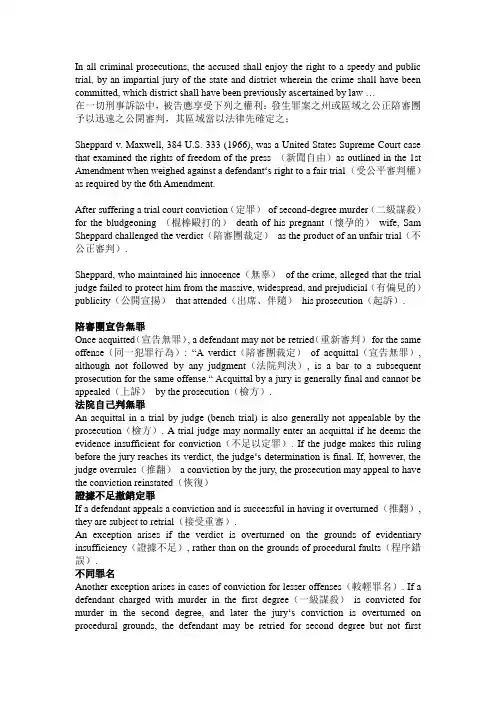
In all criminal prosecutions, the accused shall enjoy the right to a speedy and public trial, by an impartial jury of the state and district wherein the crime shall have been committed, which district shall have been previously ascertained by law …在一切刑事訴訟中,被告應享受下列之權利:發生罪案之州或區域之公正陪審團予以迅速之公開審判,其區域當以法律先確定之;Sheppard v. Maxwell, 384 U.S. 333 (1966), was a United States Supreme Court case that examined the rights of freedom of the press (新聞自由)as outlined in the 1st Amendment when weighed against a defendant…s right to a fair trial (受公平審判權)as required by the 6th Amendment.After suffering a trial court conviction(定罪)of second-degree murder(二級謀殺)for the bludgeoning (棍棒毆打的)death of his pregnant(懷孕的)wife, Sam Sheppard challenged the verdict(陪審團裁定)as the product of an unfair trial(不公正審判).Sheppard, who maintained his innocence(無辜)of the crime, alleged that the trial judge failed to protect him from the massive, widespread, and prejudicial(有偏見的)publicity(公開宣揚)that attended(出席、伴隨)his prosecution(起訴).陪審團宣告無罪Once acquitted(宣告無罪), a defendant may not be retried(重新審判)for the same offense(同一犯罪行為): “A verdict(陪審團裁定)of acquittal(宣告無罪), although not followed by any judgment(法院判決), is a bar to a subsequent prosecution for the same offense.“ Acquittal by a jury is generally final and cannot be appealed(上訴)by the prosecution(檢方).法院自己判無罪An acquittal in a trial by judge (bench trial) is also generally not appealable by the prosecution(檢方). A trial judge may normally enter an acquittal if he deems the evidence insufficient for conviction(不足以定罪). If the judge makes this ruling before the jury reaches its verdict, the judge…s determination is final. If, however, the judge overrules(推翻)a conviction by the jury, the prosecution may appeal to have the conviction reinstated(恢復)證據不足撤銷定罪If a defendant appeals a conviction and is successful in having it overturned(推翻), they are subject to retrial(接受重審).An exception arises if the verdict is overturned on the grounds of evidentiary insufficiency(證據不足), rather than on the grounds of procedural faults(程序錯誤).不同罪名Another exception arises in cases of conviction for lesser offenses(較輕罪名). If a defendant charged with murder in the first degree(一級謀殺)is convicted for murder in the second degree, and later the jury…s conviction is overturned on procedural grounds, the defendant may be retried for second degree but not firstdegree murder; the jury, by convicting the defendant of second degree murder, is deemed to have implicitly(暗示)acquitted them of first degree murder.同一犯罪De fendants may not more than once be placed in jeopardy for the “same offense”(同一犯罪行為). Sometimes, however, the same conduct may violate different statutes. The defendant had first been convicted of operating an automobile without the owner…s consent, and l ater of stealing(偷竊)the same automobile. The Supreme Court concluded that the same evidence was necessary to prove both offenses, and that in effect there was only one offense. Therefore, it overturned the second conviction.審判無效mistrialMistrials(審判無效)are generally not covered by the double jeopardy clause. If a judge dismisses the case or concludes the trial without deciding the facts in the defendant's favor (for example, by dismissing the case on procedural grounds), the case is a mistrial and may normally be retried.Furthermore, if a jury cannot reach a verdict(陪審團無法達成裁定), the judge may declare a mistrial and order a retrial. When the defendant moves for(提議)a mistrial, there is no bar to retrial, even if the prosecutor or judge caused the error that forms the basis of the motion.雙重主權The clause, it has been held, does not prevent separate trials by different governments, and the state and federal governments are considered “separate sovereigns”(不同主權). Therefore, one may be prosecuted for a crime in a state court, and prosecuted for the same crime in another state, a foreign country, or (most commonly) in a federal court.球隊隊員強暴啦啦隊員In March 2006 Crystal Gail Mangum, an African American student at North Carolina Central University who worked as a stripper(脫衣舞女),dancer and escort(儀隊), falsely accused three white Duke University students, members of the Duke Blue Devils men…s lacrosse(曲棍球)team, of raping her at a party held at the house of two team's captains in Durham, North Carolina on March 13, 2006.DNA檢測Shortly after the party, the prosecution ordered 46 of the 47 team members to provide DNA samples.On Monday, April 10, 2006, it was revealed that DNA testing had failed to connect any of the 46 tested members of the Duke University men's lacrosse team.照片指認問題During the photo identifications(照片指認), Mangum was told that she would be viewing Duke University lacrosse players who attended the party, and was asked if she remembered seeing them at the party and in what capacity.this was essentially a “multiple-choice test(複選題)in which there were no wrong answers",… "[t]he officer was telling the witness that all are suspects, and say, in effect, 'Pick three.'U.S. Department of Justice guidelines suggest to include at least five non-suspectfiller photos for each suspect included撤回起訴On April 11, 2007, North Carolina Attorney General Roy Cooper dropped(撤回)all charges and declared the three players innocent(無辜). Cooper stated that the charged players –Reade Seligmann, Collin Finnerty, and David Evans –were victims of a “tragic rush to accuse.”(急於指控之悲劇)檢察官被除名That June, Nifong was disbarred for “dishonesty(不誠實), fraud(詐欺), deceit (欺騙)and misrepresentation(不實陳述)”, making Nifong the first prosecutor in North Carolina history to lose his law license(證照)based on actions in a case. Nifong was found guilty of criminal contempt(藐視)and served one day in jail. Mangum never faced any charges for her false accusations as Cooper declined to prosecute her.法律倫理“Legal ethics” (法律倫理)in the United States is generally understood to primarily apply to lawyers, while codes of professional responsibility(專門職業人員責任)also apply in a derivative sense (indirectly) to non-lawyers who work with lawyers, such as paralegals(律師助理、法務)or private investigators(私人調查員).美國律師公會職業行為規則The American Bar Association (美國律師公會)has promulgated(公布)the Model Rules of Professional Conduct (職業行為模範規則)which, while formally only a recommendation by a private body, have been influential in many jurisdictions.各州州法自行規定律師執業守則In the United States, the practice of law is regulated by the governments of the individual states and territories(領域).Each state or territory has a code of professional conduct dictating rules of ethics. These may be adopted by the respective state legislatures and/or judicial systems.各州懲戒權Every town in the United States has a regulatory(管制性)body (usually called a state bar association) that polices(維持)lawyer conduct. When lawyers are licensed (被許可)to practice(職業) in a state, those lawyers subject themselves to this authority. Overall responsibility often lies with the highest court in a state (such as state supreme court).懲戒Lawyers who fail to comply with(遵守)local rules of ethics may be subjected to discipline(懲戒)ranging from private (non-public) reprimand(訓斥)to disbarment (取消資格).。
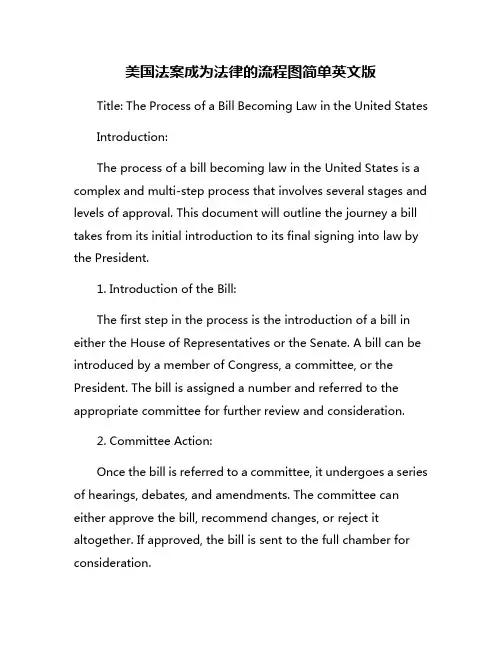
美国法案成为法律的流程图简单英文版Title: The Process of a Bill Becoming Law in the United StatesIntroduction:The process of a bill becoming law in the United States is a complex and multi-step process that involves several stages and levels of approval. This document will outline the journey a bill takes from its initial introduction to its final signing into law by the President.1. Introduction of the Bill:The first step in the process is the introduction of a bill in either the House of Representatives or the Senate. A bill can be introduced by a member of Congress, a committee, or the President. The bill is assigned a number and referred to the appropriate committee for further review and consideration.2. Committee Action:Once the bill is referred to a committee, it undergoes a series of hearings, debates, and amendments. The committee can either approve the bill, recommend changes, or reject it altogether. If approved, the bill is sent to the full chamber for consideration.3. Floor Action:The bill is debated on the floor of the chamber where it was introduced (House or Senate). Members have the opportunity to discuss the bill, propose amendments, and make final changes before voting on its passage. If the bill passes in one chamber, it is sent to the other chamber for consideration.4. Conference Committee:If the two chambers pass different versions of the bill, a conference committee is appointed to reconcile the differences. The committee members negotiate a compromise version of the bill that both chambers can agree on. Once the final version is approved by both chambers, it is sent to the President for signature.5. Presidential Action:The final step in the process is Presidential action. The President can either sign the bill into law, veto it, or take no action (pocket veto). If the President signs the bill, it becomes law. If the President vetoes the bill, it is sent back to Congress where it can be overridden by a two-thirds majority vote in both chambers.Conclusion:The process of a bill becoming law in the United States is a careful and deliberate process that involves multiple stages of review and approval. The system of checks and balances ensures that a bill is thoroughly considered before becoming law. Understanding this process is essential for anyone interested in how laws are made in the United States.。
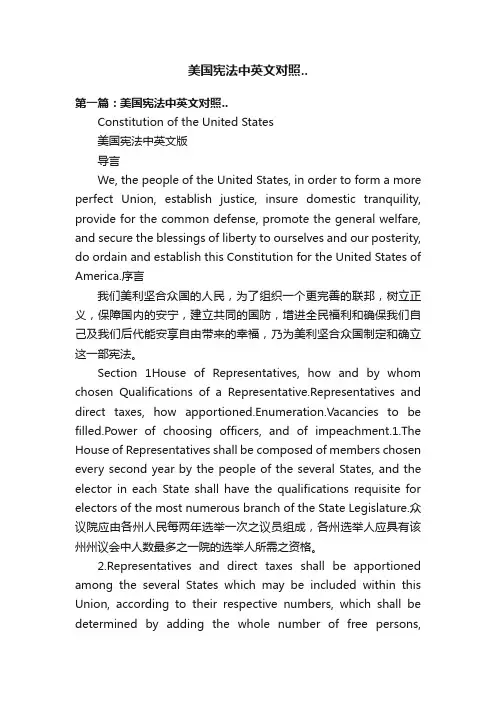
美国宪法中英文对照..第一篇:美国宪法中英文对照..Constitution of the United States美国宪法中英文版导言We, the people of the United States, in order to form a more perfect Union, establish justice, insure domestic tranquility, provide for the common defense, promote the general welfare, and secure the blessings of liberty to ourselves and our posterity, do ordain and establish this Constitution for the United States of America.序言我们美利坚合众国的人民,为了组织一个更完善的联邦,树立正义,保障国内的安宁,建立共同的国防,增进全民福利和确保我们自己及我们后代能安享自由带来的幸福,乃为美利坚合众国制定和确立这一部宪法。
Section 1House of Representatives, how and by whom chosen Qualifications of a Representative.Representatives and direct taxes, how apportioned.Enumeration.Vacancies to be filled.Power of choosing officers, and of impeachment.1.The House of Representatives shall be composed of members chosen every second year by the people of the several States, and the elector in each State shall have the qualifications requisite for electors of the most numerous branch of the State Legislature.众议院应由各州人民每两年选举一次之议员组成,各州选举人应具有该州州议会中人数最多之一院的选举人所需之资格。

《美国宪法》教学大纲汪庆华编写法学专业选修课程教学大纲808 目录PART ONE Separation of Powers (809)PART TWO Individual rights (816)美国宪法PART ONE Separation of PowersI.THE JUDICIAL POWERNo Advisory OpinionsEg .: Declaration about the constitutionality of a proposed statute Æ Ct. won’tdecide.Î There must be specific present harm or threat of specific future harm.(1) When legislation is not yet law (2) court cases where the court is notthe final authority.Ripeness: RQ: Actual harm or immediate threat of harm – consideration after the claims have been resolvedMootness – consideration before claims developed1.Moot cases are:a.Overripeb.Dismissed whenever they become moot:i.If issue becomes moot during the trial, dismissed at trial,.ii.If issue becomes moot during appeal, judgment below is vacated and the appeal is dismissed.2.Exception:Controversies capable of repetition yet evading review are not moot, even thoughthey look like moot.a.Cases always involve disputes w/ an internal time limit (issues that won’t lastlong enough for the judicial system to decide them).Eg. restrictions on abortion – challenge on restriction on abortion by a809法学专业选修课程教学大纲810pregnant woman will not be moot by deliberation of a baby: it will bechallenged over and over again b/c it is capable of repetition but will notbe resolved. = not dismissed as moot.class actions – Mootness doesn’t depend on the named orrepresentative party. A class action remains live so long as itis live as to any of the class members.B.Standing1.RQ: Injury + Causation + Redressability (ct. can give relief)2.Injury *a.Virtually anything can constitute injury, particularly if congress says so.- doesn’t have to be economic. past or future.b.Generally NOT INJURY:i.Mere ideological objectionii.Injury to someone elseBUT, IF you have suffered (or will suffer) actual injury and IF you and thesomeone are related by exchange or transaction.Eg. Doctor sues to demand medicare compensation for performingabortions can raise the woman’s rights, (3rd party standing).The doctor does not have a constitutional right to get paid buthe can raise patient’s right. (But Doctor’s claim will berejected on the merits, b/c patient has no right to abortionfunding.anization s have standing to challenge injury to their members, IF.i.* the members would have standing (actual injury);ii.their injury is related to the purpose of the organization; andiii.there’s no reason that requires the presence of individual members in the suit. (mere objection of the member = no standing)d.Taxpayersi.Have standing to challenge their tax liability (how much you pay). –spending power must be involvedHave no standing to challenge how the gov. spends its money after taxes arecollected (b/c it doesn’t affect you, money is gone no matter what.),EXCEPT for Establishment Clause challenges to gov. funding.3.Causation – never tested on bar exam, b/c factual issue. Essentially factual: did the美国宪法government’s conduct cause or will it cause plaintiff’s injury?4.Redressibilitya.Ct. can do something about the injury.b.the injury is past Æ the remedy is money damage.c.the injury is threatened Æ the remedy is injunction.E.g. Company A applies for a license and is turned down. Company B applies for a licenseand is accepted. Company A sues to bar the government from giving a license to CompanyB. Does company A have standing to seek that relief? Î No. If A is alleging “give melicense,” then A has standing, but here, A is seeking to deny B’s license = there is mismatch of injury and remedy.Political Questions5.Non-judiciable (ct. won’t decide)6.Examplesa.the Republican Form of Government Clauseb.true foreign affairs or military command decisionseg. Whether the President fires a general, recalls an ambassador, chooses to attend a summit, sending troops to state.c.seating of delegates at a national political conventiond.impeachment procedureseg. Senate’s procedures for trying impeachment and who they impeach.C.11th Amend. (not related to the provision itself)ARTICLE III JUDGE – ENJOY THE CONSTITUTIONAL GRANT OF LIFE TENUREII.The Legislative POWER* source of power and limitationA.Enumerated Powers811法学专业选修课程教学大纲812 1. In theory, fed. gov. has limited power.In fact, fed. gov. can do anything that doesn’t violate the Bill of Rights.a.power over fed. Property – congress has power to dispose of all propertybelonging to the federal government (e.g. wild animals wandering ontofederal lands are within the ambit of this power) - no express limits on thispower.b.Regulation of federal land (Article 4)c.power over citizenshipd.bankruptcy, patent, copyright powere.war powerf.power to raise an army and a navy, etc.2.Taxing power – if there is tax. E.g. tax and spend to provide for the general welfare.OK if it bears some reasonable relationship to revenue production or if Congress has the power to regulate the taxed activity.3.Spending power – if they spend federal money.Congress may investigate only matters upon which it can legislate, but it is not limited to matters as to which it has made appropriations of money.merce powerFed. gov. can regulate:a.any product or activity in interstate commerce (something across state-lines)b.even intrastate activity having a substantial effect on interstate commerce.(almost everything)i.“substantial effect” is judged in the aggregate. Answer is always yes.- It doesn’t matter whether your act causes substantial effect. It doesmatter whether everyone’s act causes substantial effect in total.c.The S.Ct. has been increasingly reluctant to allow Congress to regulate activitythat is both local / non-commercial on grounds of its effect on interstatecommerce. In the future, the regulation of intrastate activity having a substantialeffect on interstate commerce will be limited to intrastate commercial activity.5.13th Amend- broad (legislative) power against any and all racial discrimination, public or private.美国宪法6.14th Amend*a.broad but not limitless power to remedy violations of individual rights, as thoserights have been defined by the cts (equal protection, due process, civil liberty).b.14th Amend. rights exist only AGAINST GOV. So, Congress’s 14th Amendenforcement power is similarly limited to rights against Gov. (14A does notprotect rights against private actor)7.Necessary and Proper Clausea.It grants Congress the power to make all laws necessary and proper forcarrying into execution any power granted to any branch of the fed. gov. (e.g. toregulated commerce, maintain army, to prevent racial discrimination)b.It is not itself a basis of power. Æ never pick this clause on exam unless anotherenumerated fed. power is linked to it.8.Promote the general welfareÆ It is not Congress’s power by itself. E.g. congress to tax and spend for the generalwelfareFederal government can tax and spend for the general welfare; it cannot directly legislate for it. Thus, nonspending regulations cannot be supported by the general welfare clause.B.Delegation1.Delegation of legislative power to administrative agencies is PERMITTED, so long asCongress provides standards for the exercise of the delegated power. (e.g. by creationof FDA etc)C.Congressional Veto Æ UNCONSTITUTIONAL1.Congressional veto provision authorizes Congress to override individual executiveaction by simple resolution, it is UNCONSTITUTIONAL.b/c: Legislation can control executive actions by changing laws. For that change, itmust follow the prescribed rule by Fed. Con. (vetoes in 2 Houses + President’s sign/veto). Congressional veto would skip these procedures. (The president is themain player in the executive action)813法学专业选修课程教学大纲814 III.T HE EXECUTIVE P OWER *P OWERS AND LIMITATIONS,ESPECIALLY EXECUTIVE PRIVILEGESA.Domestic Power Generally1.Power to enforce the law, not to make it and not to break it.Eg. impoundment of funds: when Congress unambiguously orders funds tobe spent on a certain project or in a certain way, the President cannotreject to obey that statute even if he thinks it is wasteful).B.** Exclusively Executive Powers (Congress cannot control the following powers)1.Power to prosecuteIt may be done by independent counsel appointed by ct. to prosecute publicofficial (ie. special prosecutor)2.Power to pardon-President’s pardon power cannot be controlled by Congress.-Pardon applies to all “offenses against the US,” except in cases of impeachment.3.Power to hire/fire executive officers (other than impeachment of high level officers,eg. President, Cabinet members)a.“Executive officers” – very broad. Anyone who takes actions on behalf of USwhether it is high or low.b.Congress can hire/fire legislative staff: its own staff and others who performstaff-like functions. Congress can hire and fire those who advice them,monitor/audit/watch what they are doing(Congress cannot hire/fire an executive officer, and Congress cannot giveexecutive power to anyone it can hire/fire.)C.External Powers of the President1.No power to declare war, but power to act militarily as commander in chief evenw/o Congressional approval. But, subject to Congress’s power to enact a militaryappropriation. Congress can also control the money spent on army.D.Impeachment1.Bills of Impeachment is an accusation, on a vote of majority of the House ofRepresentatives.美国宪法2.Trial is in the Senate, w/conviction on a vote of 2/3.3.Remedy on conviction is removal from office. (one and only remedy)4.Until removed from office, only President is absolutely immune for all official acts.815法学专业选修课程教学大纲816PART TWO Individual rightsI.S TATE A CTION* ANALYZE FIRSTSince Con. Law generally applies only to gov. action (eg. 14th Amend), state action must beinvolved to show constitutional violation. Constitutional right is a right against gov’t.A.State action = Gov. action, whether state or localEg. municipal ordinance, sheriff’s decision to fire a deputy, county zoningvarianceB.Not facilitating private discrimination – mere acquiescence not enough.. cannot encourage/facilitate private discrimination.. cannot profit from (i.e. be a financial partner in) private discrimination.3.Constitution forbids discriminatory state action, not private bias Æ federal legislationthat prohibits private discrimination is not constitutionally mandated, and state may aidanyone as long as it does not violate a specific constitutional restriction.ernment is not required to prevent private discrimination constitutionallyGenerally, Gov. is acting constitutionally WHEN it is acting evenhandedly, even though aprivate person is discriminated. (Treating all alike is OK even if private person discriminates)Eg. 1. It is constitutional for Gov. to enforce trespass laws when the landownerrefuses to allow access on the basis or race. (so long as Gov’t isregulating even-handedly on behalf of all the land-owner)2.It is constitutional for Gov. to issue a liquor license to a raciallyexclusive private club, AS LONG AS Gov. treats all applications in thesame way.D.* Distinguish anti-discrimination statutesWhen there is anti-discrimination statutes, the existence of state action is IRRELEV ANT.Eg. Title VII of the 1964 Civil Rights Act prohibits racial discrimination byemployers.1) Is there state action when a private company refuses to hire blacks?Æ No state action.2) Is it illegal for a private company to refuse to hire blacks?Æ Yes. It is ILLEGAL under the statute, not Con.817P ROCEDURAL D UE P ROCESSBasic Principles:Right to Notice & Hearing before Intentional Deprivation of Life, Liberty, or Property by Gov.2 Qs:1) Is Life, Liberty, or Property being Taken?2) If so, What Process is Due?E.Life, Liberty, Property1.Life - death penalty2.Libertya.Confinement (parole, probation)b.Physical punishmentc.Curtail of legal right3.Propertya.Property = Entitlement, not mere expectation.b.Entitlement to a gov. job/benefit is created WHEN they say so.Eg. 1. County attorney is hired at will. 3 months later she is fired, w/onotice or explanation. Is she entitled to notice and a hearing?Æ No, she is no entitlement in that right.2. County attorney is hired for 5 yrs, and told that she won’t bedischarged before that time except for cause. 3 months later she isfired. Is she entitled to notice and hearing?Æ Yes, she had entitlement for 5 yrs term job security.F.DeprivationDue process is triggered by INTENTIONAL deprivation, not accidents. (C.f. tort claim)Eg. City garbage truck hit a person to death. Æ although it is a deprivationof life/liberty, No due process problem (can be a tort problem)G.What process is due?1.Balance 3 factors:a.Importance of interest at stakeb.Value of procedure in protecting the interest (includes any kind of trial type818procedure)c.What’s the cost (Gov’s interest and efficiency)2.Timing of hearings – before, but sometimes after- especially for discharge of public employeesa.Generally, a tenured public employee* is entitled to some opportunity to beheard prior to discharge. (* “tenured” employee = anyone who needs “for cause”to be discharged.)b.Exception: When there is a significant reason not to keep the employee on thejob, discharge first, then hearing.That hearing must:i.be promptii.offer complete relief (if wrongfully discharged, the employee can get paid)c.Eg. Police officer charged w/felony1) Normal procedure: Suspend w/pay Æ Hearing Æ Discharge2) Felony case: Discharge first Æ HearingA CCESS TO C OURTS FOR I NDIGENTS. has to waive filing fees for divorce but NOT for bankruptcy. (timely issue!)Waiver of filing fees for indigents is constitutionally required WHEN charging the fees would deny a fundamental right.Bankruptcy is just a statutory scheme, not a fundamental right.Ù marriage and divorce are fundamental rights – 8th Amend.Eg. Indigent cannot be required to bear the cost of a transcript in order to appeal a termination of parental rights, b/c parental rights arefundamental.T AKING AND J UST C OMPENSATION –5TH A MEND.Private property shall not be taken for public use, w/o just compensation.“Private property”“Public use” = whatever Gov. wants to do“Just compensation” = FMV at the time of taking Ù regulation under police power not requiring just compensation819I NTRODUCTION TO THE 14TH A MEND.I.Privileges and Immunities of National Citizenship“No state shall enforce any law which shall abridge the privileges and immunities of citizens of the US” = applies only to attributes peculiar to US citizenship, such as right to petition congress.”Æ means nothing!Ù Article 4 of privileges and immunities: provides that citizen of each state shall be entitled to all privileges and immunities of citizens of other states w/regard to “fundamental rights,” i.e., those involving important commercial activities or civil liberties.J.Federal and State distinguished1. 2 due process clauses:a.5th Amend. Æ National Gov.b.14th Amend. (which makes many of bill of rights provisions applicable to states).Æ States / localities2. 1 equal protection clause:a.14th AmendÆ States / localities (NOT to federal gov’t)b.Technically, no equal protection clause for national gov. But, they have to obeythe principle of equal protection clause, but by different standard. (usually by 5A)K.Standard of Review1.STRICT SCRUTINY– Is the law necessary achieve a compelling governmentalinterest?a.Burden of proof – on Gov.b.Applies when the law involves a suspect classification / fundamental right.2.INTERMEDIATE SCRUTINY - Is the law substantially related to an importantgovernmental interest?a.Burden of proof – on Gov.b.Applies to legitimacy and gender.8203.RATIONAL BASIS– Is the law rationally relates to a legitimate governmental interest?a.Burden of proof – on plaintiffb.Applies to everything else.821E QUAL P ROTECTIONL.Suspect Classifications: Race or Ethnicity1.Checkpoints:a.When is a law a racial/ethnic classification?b.Î When there is proof of discriminatory purpose (intended to treat persons basedon race, ethnicity). The purpose does not have to appear superficiallydiscriminating.2.School desegregationa.De jure segregation (segregation on purpose) is Uncon.b.De facto segregation is OK.c.Remedy is limited by the geographical area of violation.Eg. Busing remedy may be ordered only w/i the city guilty.IF the suburbs are also involved, busing may be ordered to the suburbs.3.Affirmative action “racial preference in favor of minority– unsettled issuea.Test: Strict scrutiny b/c racial classification.b.Results: Cts split (some uphold, others struck down).c.Always valid WHERE it specifically corrects past discrimination againstminorities.general, social concern Æ Not good enoughspecifically redress misconduct in the agency Æ OKM.Suspect classifications: Alienage**N.Quasi-Suspect classifications: Legitimacy Æ Intermediate scrutinyO.Quasi-Suspect classifications: Gender Æ Intermediate scrutinyP.Rational basis test: Everything else-If no constitutional concern is found in a Q, use this test and uphold it.822FUNDAMENTAL R IGHTSQ.Substantive Due process / Equal protectionSame strict scrutiny and same fundamental rights under both.If not fudamental right Æ rational basis test.R.RIGHT TO PRIV ACY1.Marriage/Divorce - B asically Æ Rational basis test (eg. Can you marry your cousin?)At the core Æ Strict scrutiny (b/c fundamental right)2.Contraception - everyone has the right to buy and use them.3.Abortion – 2 conflicting interests (Mother’s right to decide v. Protection of mother’sbody and fetus)2 rules:a.pre-viability rule(Terminate pregnancy for any reason until when the baby can live outside(viability of fetus test)Procedural regulations are valid ONLY IF they impose NO undue burden to thewoman’s right to terminate her pregnancy.rmed consent RQ Æ OKii.24-hour waiting RQ Æ OK (to prevent hasty action)iii.Parental notification (for under-age female) Æ OKiv.Parental consent RQ (for under-age female) Æ NO, unless there isjudicial bypass (= abotion w/judge’s consent).v.Spousal consent RQ Æ NOvi.30 days residence RQ to obtain abortion rights – likely to be unconst.b.post-viability ruleRegulation is OK, unless the woman’s health is threatened.Cf. Gov. financing Æ Never required (no gov. obligation to finance abortion)4.Obscenity in the home Æ fundamental right. But, you cannot sell, buy, distribute,receive or transport it.5.Certain family relationship s Æ fundamental righta.right to raise/educate childrenb.right to live together w/close relatives (if they want you to)823c.no right to outside family6.No right to homosexual relations / sodomy7.No right to hide – Gov. can investigate you, your personal data.Voting rightsVoting fact pattern w/due process Q+ discrimination Î always equal protection basis.8.One person/one vote (each district must have the same size of voters) applies to: House of Rep.b.both houses of a state legislaturec.local gov., if a ward systemd.NOT elections for mayor of each city or a judge of each countye.NOT election of persons to serve on a special purpose gov. unit: if the gov. unithas a special impact on the class of enfranchised voters.Eg. “water storage districts”9.Gerrymandering : Racial/PoliticalYou can take race into account so long as you don’t go too far.Æ Race can be a factor, but not the predominant factor.IF the district looks funny, it is Uncon.a.Racial gerrymandering to disadvantage minorities (e.g. vote dilution = spread outblacks so that they are all margin of each district)Æ Uncon. unless Gov. has acompelling interest.b.Racial gerrymandering to advantage minorities (e.g. voting rights act; bringing allthe minority in one district and creating them a majority in that district)Æ OKc.Political gerrymandering ÆIn theory, violates equal protection.In fact, commonly occurs b/c proof RQ is almostnever met.S.RIGHT TO TRA VELÆ fundamental1.Long-term residency RQs (e.g. for citizenship) burden the fundamental right ofinterstate travel ÆViolates equal protection.a.How long is too long?- 2 yrs for welfare Æ too long- 1 yr Æ too long for most purposes- as long as 1 yr Æ has been upheld for in-state tuition / divorce jurisdiction824- 30 days to promote the compelling interest of assuring that only bona fideresidence only = has been held OK.2.Right to travel interstate = right to migrate from state to stateT.No other fundamental rights – Don’t add the above list!1.right to Wealth? Æ Not fundamental2.right to Education Æ Not fundamental(Some basic public school opportunity Æ maybe fundamental)3.right to Inherent Æ Not fundamental4.right to control own body Æ Not fundamental5.man’s right to have short hair – may be an equal protection issueF REEDOMS OF S PEECH AND P RESSU.Vagueness / Overbreadth1.Vagueness – If law gives no clear notice of what is prohibited, it is vague.2.Overbreadth – If law burdens substantially more speech than necessary for acompelling interest, it is overbroad.V.Freedom not to speakGov. cannot force you to endorse any symbol or slogan.Eg. “Live Free or Die”Eg. Statements from anti-nuclear power activists.W.Fundamental distinction: Content-neutral v. Content-based-First, distinguish one from another.-Content neutral regulation = common/usually not so controversial/usually valid-Content based restriction on speech = rare/intensely controversial/usually invalidX.CONTENT-NEUTRAL REGULATION1. 3 RQs: Time, Place, Manner of speech Æ not content-based reg.a.Must be Content-neutrali.As administered, as well as on its face.ii.* No executive discretion: If there is discretion, risk of content-based reg.exists.Eg. DC anti-picketing ordinance for 500-feet area around a foreign825embassy Æ Not content-neutralEg. Parade permit ordinance requires everyone to apply for a permit24 hours in advance and to avoid routes used by emergencyvehicles. Permits are given first-come, first-served.Æ OK (b/c evenhanded, no executive discretion)If permits are issued when the chief of police finds it in the publicinterest, uncon. b/c the chief of police is given discretion.b.Substantial other opportunities for speech to take placeEg. City bans soundtrucks in residential neighborhoods bet. 11pm and7am. Æ OKIf bans at all times and places, uncon.w must narrowly serve a significant state interest.- not “compelling” “Significant” means everything that makes sense.2.Public forum doctrinea.“Public forum” = Gov. property traditionally open to a wide range of speechactivities- In public forum, ONLY content-neutral reg. of time or manner are allowed.i.streetsii.parksiii.public sidewalksiv.NOT airportsb.Non-public forum = Gov. property not traditionally open to speech activities(public school, public hall)- Relaxed scrutiny applies even to content-based reg. Any reasonable reg. onspeech is OK. (reasonableness depends on the purpose)Eg. Prison can prevent public access for security. Court house andits groundY.CONTENT-BASED REGULATIONGenerally, require a compelling state interest and are invalid. Subject to strict scrutiny,usually struck down)Eg. flag desecration (burning) Æ struck down b/c content-based1.Exception 1: INCITEMENTSpeech intended to incite immediate violence Æ Can be restricted even beforeviolence2.Exception 2: FIGHTING WORDS / HATE SPEECHa.In theory, not protected speech. Fighting words = words that are so insulting that 826the person who heard it might hit back or breach peace)b.In practice, all laws banning fighting words / hate speech are unconstitutionallyvague or overbroad. Often cts say: “fighting words are not protected, but thisstatute is too broad”Eg. “words tending to a breach of the peace”“offensive or abusive language”speech”“hate3.Exception 3: OBSCENITYa.Material must be:i.S exy (erotic, itchy, appeals to prurient interest – bloodshed is insufficient)ii.S ickening – grossly (patently) offensive to average member ofcommunity (community can be whole US, state or city, but has to be judgeby ordinary person in the community)iii.S tandards – average US citizen If the rule doesn’t have standard – then it is too broad.ck of S erious value – educational/political (if good reviews, noobscenity)Eg. Can the law prohibit as obscene material that “excites lust”?Æ No, b/c “lust” is overbroad.Eg. Can a city impose a tax on all films that show frontal nudity?Æ No, b/c overbroad. Some are obscene, some are not.Eg. Communications Decency Act (federal ban on “indecent”/”patently offensive” but not legally obscene internet communications to minors)Æ Struck down, b/c no practical way to assure that communications sentthrough the internet would not be received by minors.b.Seven dirty words – although not obscene, broadcasting during hours whenchildren might hear CAN be BANNED.c.Child pornography – CAN be BANNED, whether or not it is legally obscene.d.Zoning adult theaters – CAN be BANNED.But, “adult film” cannot be banned, b/c overbroad4.Exception 4: DEFAMATION (covered in torts)5.Exception 5: COMMERCIAL SPEECHMust be allowed if truthful and informational.Can be subject to significantly more regulation than non-commercial speech.E.g. advertisement827Can be suppressed in 3 circumstances:a.Misleading attention cannot ban political misleading speech.Eg. Marijuana- commerce: cannot advertise- political: can advocate to legalize itb.Pertaining to illegal productc.If the law directly advances a substantial *state interest and the degree ofsuppression is no greater than is reasonably necessary.Has to be narrowly tailored to serve the substantial interest.The law must be well-crafted.(More and more cts. are likely to strike down commercial speech reg.)*Substantial interest - not compelling “substantial” is a buzz word, thisword is only here in speech area.inclu. alcohol, tobacco, gamblingEg. Can US Postal Service prohibit mailings of unsolicitedadvertisements on the ground that many recipients would findthe ads offensive? Æ NO b/c ads are not misleading,condoms are legal/no substantial interest in limitingcontraception.Z.FREEDOM OF THE PRESS – generally, the freedom of the owner/publisher The press have no greater nor smaller 1st Amend. freedom than private citizen’s.AA.ELECTORAL PROCESS (campaign, ads, etc.)1.Contributions (& coordinated expenditures) Æ Can be limited (eg. $10000 to 1 party)2.Expenditures (if direct) Æ Cannot be limited.3.Regulation of the electoral process: if the law regulates “core political speech” ratherthan the surrounding election Æ strict scrutiny applies.e.g. state law prohibiting any campaigning on election day – invalid.BB.SPEECH BY GOV. EMPLOYEES1.General rule: Public employees cannot be HIRED/FIRED based on political party,political philosophy, any act of expression.2.Exception – High-level policymakers / their confidential advisersCan be fired for Not Doing the Job – Consider the impact on the job (if it affects the 828。
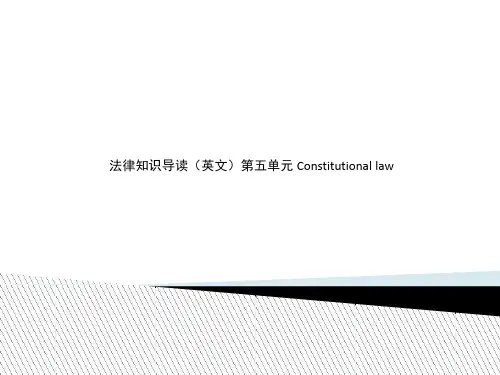
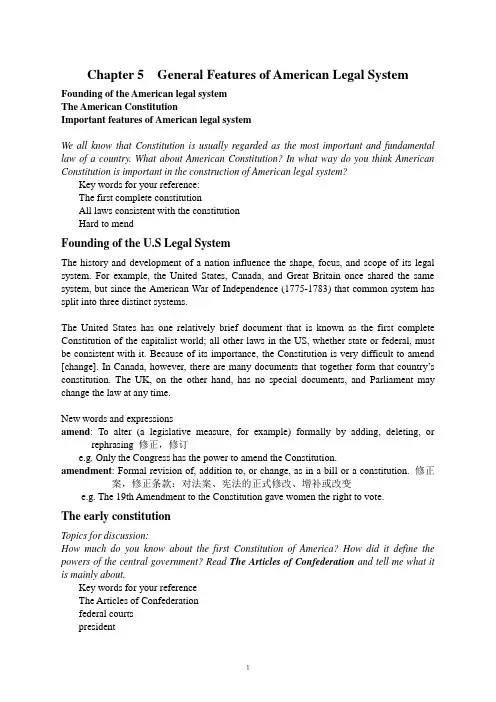
Chapter 5 General Features of American Legal System Founding of the American legal systemThe American ConstitutionImportant features of American legal systemWe all know that Constitution is usually regarded as the most important and fundamental law of a country. What about American Constitution? In what way do you think American Constitution is important in the construction of American legal system?Key words for your reference:The first complete constitutionAll laws consistent with the constitutionHard to mendFounding of the U.S Legal SystemThe history and development of a nation influence the shape, focus, and scope of its legal system. For example, the United States, Canada, and Great Britain once shared the same system, but since the American War of Independence (1775-1783) that common system has split into three distinct systems.The United States has one relatively brief document that is known as the first complete Constitution of the capitalist world; all other laws in the US, whether state or federal, must be consistent with it. Because of its importance, the Constitution is very difficult to amend [change]. In Canada, however, there are many documents that together form that country’s constitution. The UK, on the other hand, has no special documents, and Parliament may change the law at any time.New words and expressionsamend: To alter (a legislative measure, for example) formally by adding, deleting, or rephrasing 修正,修订e.g. Only the Congress has the power to amend the Constitution.amendment: Formal revision of, addition to, or change, as in a bill or a constitution. 修正案,修正条款:对法案、宪法的正式修改、增补或改变e.g. The 19th Amendment to the Constitution gave women the right to vote.The early constitutionTopics for discussion:How much do you know about the first Constitution of America? How did it define the powers of the central government? Read The Articles of Confederation and tell me what it is mainly about.Key words for your referenceThe Articles of Confederationfederal courtspresidentsingle chamber of CongressIn order to understand US law, we must look at the founding of the US and the uniting of the individual colonies into a single nation. The American War of Independence brought the original thirteen colonies together to fight a common foe, the British. The colonies, declaring themselves independent states, originally agreed to a very weak confederation in order to defeat their common enemy. This first federal constitution of the US, “The Articles of Confederation,” was written in 1777 and was finally ratified [approved] by the states in 1781. (The first constitution of the United States, passed by The second Continental Congress in 1778, but not ratified until 1781, replaced by the present constitution in 1789 due to lack of governmental powers.)In this first form of American government, there were neither federal courts nor a president and the single chamber of Congress had no way to enforce its laws. The individual states could and did ignore federal laws with impunity. It quickly became clear that the US would not remain united long unless the role of the federal government was strengthened.New words and expressions1. Confederation: The act of forming into or becoming part of a confederacy. 联邦, 结盟2. ratify: To approve and give formal sanction to; confirm. 批准, 认可e.g.“Amendments . . . shall be valid . . . when ratified by the Legislatures of three fourthsof the several States” (U.S. Constitution, Articl e V).“修正案…当为四分之三的州立法机构赞同时…将生效”(美国宪法,第五条)ratification3. with impunity: without fear of consequences不受惩罚地美国历史上最重要的两个文件:独立宣言和第一部宪法。
美国的法律文化内容摘要:美国的法律已经渗透到人民生活的各个方面,它不仅作为一种政治制度而存在,更多的已经成为美国的文化以及人民的生活方式。
因此研究美国法律不仅要关注法律本身,更要看到法律对美国人民在生活方式、思维方式以及价值观等方面的影响。
关键词法律文化电影民主自由律师法律归根结底是被国家赋予的强制性社会规范。
法律就是法律。
人们可以通过某种正当的方式修改和废除法律,但必须遵守还在生效的法律,程序正确和遵守法律甚至于比正义和公众情绪更重要,这并不是说法律和司法制度可以无视民意或者无懈可击。
毕竟,法律存在的目的是非常现实的,它要维护社会正常秩序,而不是维护虚幻的"正义"。
这是因为每种文化、每个阶层、每个社群,甚至每个人心中的正义都截然不同。
正是由于法律是一种强有力的社会规范,它才会对人们产生及其深远的影响。
美国法律来源于英国法,又根据美国政治、经济和文化特点作了较多的改变。
美国建国初期就制定了成文的联邦宪法,但联邦和各州都自成法律体系。
由于美国法律自身的特性,使得它对美国社会文化的影响更为深远。
一、美国法律对电影的影响现实生活中,当人们说美国人"好打官司"或"权利意识强"时,他们便是在评价美国法律文化。
其实,法律电影也就是法律文化,许多好莱坞法律电影正是通过法律个案的通俗分析以阐释美国的法律文化。
现实生活中的法律案例作为电影的来源对电影的发展起着至关重要的作用,“巧妇难为无米之炊”,没有这些题材,编剧纵使插上想象的翅膀也很难自由翱翔。
从另一角度来说,美国的法律电影也对美国法律产生了重要影响。
许多有社会影响力的法律电影题材总是关注美国社会和民众日常生活中最严肃与最实际的问题,必将对法律职业者以及对社会大众的法律观念产生涟漪影响。
美国法律对电影的影响还体现在情节的设计上。
美国法律电影之所以引人入胜,在于它们提供了一种彼此当面对抗的戏剧效果:律师精心地设计询问技巧,机敏地揭露证人言词的自相矛盾之处,或者通过归谬法让作伪的人陷于难以自圆其说的窘境之中,所有这些,都是一个法庭律师的基本功,也是法律电影着力表现之处。
英美文化教程Unit 5Chapter 5 Industry, Agriculture and BusinessI. Focal PointsII. Questions and Answers on the TextI. When did Britain emerge as the world's greatest political and economic influence?Britain emerged as the world's greatest political and economic influence in the second half of the nineteenth century.2. What did the economic theory of mercantilism hold?The economic theory of mercantilism held that the acquisition of gold and silver, in payment for goods exported, increased the wealth of a nation.3. According to the above theory, how could a country become wealthy and self-sufficient?Only by an excess of exports over imports could a country grow wealthy and self-sufficient.4. How did Britain obtain gold and silver from other countries?Britain obtained gold and silver by selling its surplus products abroad.5. What were the two companies mentioned by the author as great trading companies under the theory of mercantilism?The two companies were the Hudson's Bay Company of Canada and the East India Company of India.6. In which country did the Industrial Revolution begin first?The Industrial Revolution began first in Britain.7. Why was Britain in a unique position to benefit from free trade?Because Britain could use new and more efficient manufacturing methods and sell goods at the cheapest prices overseas.8. What were the principal energy resources in Britain at the end of the eighteenth century?The principal energy resources were coal and water power.9. What is one of the oldest and most basic of all industries in Britain?It is coal-mining.10. Why did factories come into being?Because it was more economical to manufacture goods under one large roof, where power could be concentrated, rather than in the small rooms and back-yards of thousands of individual workers.11. What did the Luddites do in the early 1800s?They smashed and destroyed new factory machinery.12. Why did they do that?Because they thought that factory machines had robbed them of their jobs.13. Why were there many critics condemning industrialization and mechanization in the nineteenth century?Because many people believed that the immigration of workers from the more natural life of the countryside to the unhealthy, crowded conditions of industrial areas would bring grave social problems.14. Who most severely attacked the Industrial Revolution?The poet William Blake.15. What did the industrialization bring to Britain?It brought Britain many economic advantages and made it an exceedingly rich and powerful nation.16. Who suffered behind the achievements of industrialization?Working people suffered most. They were forced to work long hours for meagre wages and to live in squalid, crowded housing, crowded together.17. What factors influenced the location of industry in Britain?The factors included ready availability of power and raw materials as well as easy access to transport facilities and ports.18. What kind of industrial area is extremely vulnerable to economic hardship in time of depression?An area that is totally dependent on one industry alone is extremely vulnerable to economic hardship in time of depression, when demand for that particular industry's products falls.19. Are there any state-run industries in Britain?Yes, there are.20. What is the position of industries nationalized in Britain' s mixed economy?Nationalized industries account for 10 per cent of the Gross National Product, 8 per cent of all employees and yet almost 20 percent of total industrial investment.21. Why did Napoleon once call the British "a nation of shop-keepers" ?Because the United Kingdom had many small businesses.22. Give three examples of Britain's top industrial giants.British Petroleum; Shell Transport and Trading; Imperial Chemical Industries.23. Why did the government set up a Monopolies and Mergers Commission in 1973?Because the government wanted to prevent the emergence of monopoly.24. How has the pattern of British industry changed since the Second World War?Manufacturing industries have declined and service industries have grown.25. What has caused an economic imbalance between different parts of Britain?It has been caused by a decline in demand for products from some of the older traditional industries, and has led to unemployment and migration of workers.26. What measures have been taken to halt the regional decline?In order to halt the regional decline, successive governments since 1945 have encouraged new industrial development in the affected areas.27. What has the discovery and exploitation of oil and gas in the North Sea resulted in?It has created thousands of new jobs and has also involved many ancillary industries. 28. Is agriculture one of Britain's most important industries?Yes, it is.29. How is the farm efficiency in Britain?The farm efficiency in Britain is one of the highest in the world.30. What does the EEC stand for?It stands for the European Economic Community.31. Why are British farmers dissatisfied with the EEC agricultural policy?Because they believe that their efficient agriculture is having to support uneconomic farming in some other parts of the Community.32. Apart from agriculture, what is the other productive British industry which has had to reduce its activities because of EEC policies?It is fishing.33. How is the oil supply in Britain?Britain is now self-sufficient in oil, and is even an oil exporter.34. What are invisible earnings?Invisible earnings are the wealth created by Britain' s service industries.35. Which are now greater in Britain in terms of output and employment, manufacturing enterprises or non-manufacturing businesses?Non-manufacturing businesses are greater both in terms of out-put and employment.36. What are the three main groups that invisible earnings fall into?The three groups are: receipts and payments for service supplied abroad; interest, profits and dividends arising out of British investment overseas; foreign currency brought into the country by tourists.37. What is the City of London?The City of London is the oldest part of London and ranks as one of the world's most important financial centres. It contains the Bank of England, the Stock Exchange, Lloyd' s and other famous trading and financial organizations.38. What is the main activity 'in the City?The City's main activity is buying and selling commodities, services and finance for commercial investment,, as well as stocks and shares in all kinds of businesses and industries throughout the world.39. On what condition can a person operate on the "trading floor" of the Stock Exchange?To operate on the 'trading floor' of the Stock Exchange, a person must be elected a member and either be a stock broker or a jobber.40. What is the Stock Exchange which has the greatest turnover in the world?The Stock Exchange in London has the greatest turnover in the world.41. What is the motto of the Stock Exchange?The motto of the Stock Exchange is "my word is my bond".42. What is the motto of Lloyd's the famous insurance brokers?The motto of Lloyd's is "With the utmost faith"--"Fidentia".43. What does the Bank of England do?It prints and issues currency notes and also controls the country's gold reserves.44. Why is the Bank of England nicknamed "the Old Lady of Threadneedle Street" ?Because it stands in a street called Threadneedle.III. Explanations1. mercantilism(1) It was an economic theory practised by British government in the eighteenth and nineteenth centuries. (2) It held that the acquisition of gold and silver, in payment for goods exported, increased the wealth of a nation. (3) Only by an excess of exports over imports could a country grow wealthy and self-sufficient. (4) Britain sold its surplus products abroad for gold and silver through extensive trade.2. Luddites(1) They were a group of workers against machines in the early 1800s in Britain. (2) They smashed and destroyed new factory machinery, because they believed that factory machines had robbed them of their jobs.3. William Blake(1) He was a British poet in the nineteenth century. (2) He attacked industrialization severely in his poem Jerusalem. (3) He referred to factories as 'dark satanic mills' and accused them of polluting 'England's green and pleasant land'.4. Britain' s mixed economy(1) In Britain's mixed economy, nationalized industries account for only 10 percent of the Gross National Product. (2) The economy is largely in private hands. (3) One tenth of the economy is controlled by foreign commercial interests.5. British Agriculture(1) Agriculture is one of the country' s most important industries. (2) Farm efficiency and production have increased greatly over recent years in spite of the decline in manpower. (3) It has one of the highest output per worker in the world. (4) British farmers are dissatisfied with the EEC agricultural policy because they believe that they are supporting uneconomic farming in other parts of the EEC.6. Invisible earnings(1) The wealth created by Britain' s service industries is called invisible earnings. (2) Invisible earnings fall into three main groups: receipts and payments for services supplied abroad; interest, profits and dividends arising out of British investment overseas; and foreign currency brought into the country by visiting tourists. (3) Britain's invisible earnings are second only to that of the United States.7. the City of London(1) It is the oldest part of the capital and ranks as one of the world's most important financial centres. (2) It contains the Bank of England, the Stock Exchange, important industries and many of the world's top commodity market, etc. (3) Its main activity is buying and selling commodities, services and finance for commercial investment, as well as stocks and shares in all kinds of businesses and industries throughout the world.8. the Bank of England(1) It is the nation's central bank. (2) It is run by a governor and a group of directors appointed by the Crown. (3) It prints and issues currency notes and controls the country' s gold reserves.9. the Stock Exchange(1) It is the largest and most important stock exchange in Britain and in the world (2) It has a greater turnover than any other market in the world. (3) Its motto is ' My word is my bond'. (4) It has a history of more than two hundred years.10 . Britain's Industrial Revolution(1) The Industrial Revolution took place first in Britain in the eighteenth century. (2) The Industrial Revolution owed a great deal to the invention of the steam engine. Factories came into being because they brought about more benefits to the owners. (3) The revolution brought many economic advantages to Britain and made Britain an exceedingly rich and powerful nation, but it also caused some social problems. (4) The successes and achievements of industrialization were founded on the exploitation of working people.。
1General overview2 1.1 Sources of law3 1.2 Constitutionality∙ 2 American common law∙ 3 Levels of law1 3.1 Federal law2 3.1.1 Federal statutoryenactment procedure▪ 3.1.2 Federalregulatorypromulgationprocedure▪ 3.1.3 Formulation offederal precedent3 3.2 State law▪ 3.2.1 Attempts at"uniform" laws4 3.3 Local law∙ 4 Types of law1 4.1 Procedural law▪ 4.1.1 Criminalprocedure▪ 4.1.2 Civilprocedure2 4.2 Substantive law▪ 4.2.1 Criminal law▪ 4.2.2 Contract law▪ 4.2.3 Tort law∙ 5 Odd exceptions∙ 6 See also1 6.1 Lists∙7 References∙8 Further reading∙9 External links•1概览1.1法的渊源Ø 1.2合宪•2美国普通法•3法律层次Ø 3.1联邦法律3.1.1联邦法定程序制定♣3.1.2联邦法规的颁布程序♣3.1.3制定联邦先例♣Ø 3.2州际法律3.2.1“统一”的法律企图♣Ø 3.3当地法律•4法律类型Ø 4.1程序法4.1.1刑事诉讼程序♣4.1.2民事程序♣Ø 4.2实体法4.2.1刑法♣4.2.2合同法♣4.2.3侵权法♣•5稀奇古怪的例外•6参见Ø 6.1列表•7参考资料•8延伸阅读•9外部链接The law of the United States consists of many levels[1] of codified and uncodified forms of law, of which the most important is the United States Constitution, the foundation of the federal government of the United States. The Constitution sets out the boundaries of federal law, which consists of constitutional acts of Congress, constitutional treaties ratified by Congress, constitutional regulations promulgated by the executive branch, and case law originating from the federal judiciary.1、The Constitution and federal law are the supreme law of the land, thus circumscribing限制state and territorial laws in the fifty U.S. states and in the territories.[2] In the unique dual双重的-sovereign元首system of American federalism (actually tripartite when one includes Indian reservations), states are the plenary充分的sovereigns, while the federal sovereign possesses only the limited supreme authority enumerated in the Constitution. Indeed, states may grant their citizens broader rights than the federal Constitution as long as they do not infringe破坏on any federal constitutional rights.[3] Thus, most U.S. law (especially the actual "living law" of contract, tort, criminal, and family law experienced by the majority of citizens on a day-to-day basis) consists primarily of state law, which can and does vary greatly from one state to the next.[4][5]The most important source of law is the United States Constitution. All other law falls under and is subordinate to that document. No law may contradict the Constitution.Federal law originates with the Constitution, which gives Congress the power to enact statutes for certain limited purposes like regulating interstate commerce.State lawThe fifty American states are separate sovereigns with their own state constitutions, state governments, and state courts (including state supreme courts).[37] They retain plenary power to make laws covering anything not preempted by the federal Constitution, federal statutes, or international treaties ratified by the federal Senate. Normally, state supreme courts are the final interpreters of state constitutions and state law, unless their interpretation itself presents a federal issue, in which case a decision may be appealed to the U.S. Supreme Court by way of a petition for writ of certiorariAll states have a legislative branch which enacts state statutes, an executive branch that promulgates发布state regulations pursuant按照to statutory authorization, and a judicial branch that applies, interprets, and occasionally overturns推翻,颠倒both state statutes and regulations, as well as local ordinances.法令法条Local lawStates have delegated lawmaking powers to thousands of agencies, townships, counties, cities, and special districts. And all the state constitutions, statutes and regulations (as well as all the ordinances and regulations promulgated by local entities) are subject to judicial interpretation like their federal counterparts.[43]∙ 4.1程序法4.1.1刑事诉讼程序♣4.1.2民事程序♣Ø 4.2实体法4.2.1刑法♣4.2.2合同法♣4.2.3侵权法♣4 Types of law1 4.1 Procedural law 4.1.1 Criminal procedure4.1.2 Civil procedure2 4.2 Substantive law 4.2.1 Criminal law3 4.2.2 Contract law4 4.2.3 Tort law。